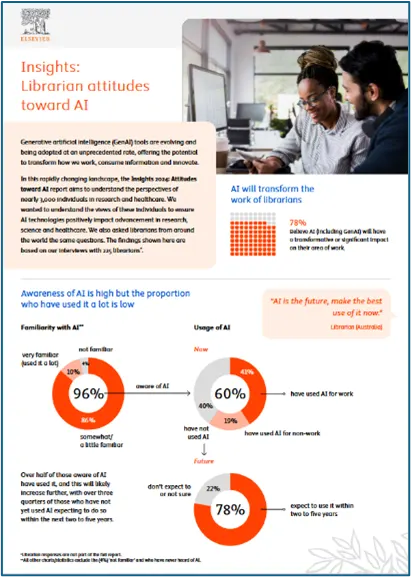The role of AI in universities is growing — what does that mean for librarians?
16 July 2025
By Linda Willems

According to the author of a new AI course for LIS students, information professionals are uniquely placed to advocate for a responsible AI approach
Over the past few years, artificial intelligence (AI) has become part of our daily lives, embedded in the tools and resources we rely on.
And since the launch of the ChatGPT in 2022, its use has grown exponentially, raising questions about how we can enjoy AI’s benefits, while safely navigating its pitfalls.
Shining a light on the views of librarians
In 2024, together with independent market research firm Ipsos, Elsevier surveyed more than 3,000 people working in academia and healthcare to discover their thoughts on AI.
And what emerged is that many of the university librarians we interviewed are excited about AI. For example:
98% think the technology will accelerate knowledge discovery
97% expect it to benefit library/information profession activities
83% believe it will increase work quality overall
However, their enthusiasm is tempered by concerns the technology could fuel misinformation (92%), erode critical thinking skills (84%) and cause critical errors or mishaps (84%).

Discover how librarians feel about AI in our report Insights: Librarian attitudes toward AI
Download the accompanying infographic
Former librarian Don Simmons, now Assistant Professor at Simmons University’s School of Library and Information Science, has a lot of sympathy for these views.
“I get it, AI can be really scary at times,” he admits. “But that scary aspect also comes with resourceful advantages – AI can greatly benefit our librarian profession, our skill set and our students.”
Preserving the library’s relevance
According to Don, one of the major benefits of AI is the opportunity it offers to reinforce the library’s value on campus. “Some say libraries are losing relevance in this digital age, or criticize them for their collections, especially when librarians push back against book bans,” he explains. “At the same time, we have an administration that's cutting funding for libraries — there are so many daunting issues, which hurt our profession at all levels.”
Whether you perceive AI as a good or bad thing, it offers an opportunity to amplify our profession, so that we not only remain relevant, but become the source to go to when anyone wants to learn more about AI navigation and AI literacy.
Don Simmons
Assistant Professor at Simmons University’s School of Library and Information Science
He adds: “I'm not saying that AI literacy is the escape key for all these problems but adding it to our toolkit will certainly help. And by leading the AI effort, we can ensure these tools benefit us, not replace us.”
In fact, he believes that librarians who fail to proactively adopt AI run the risk of falling behind. “The rise of generative AI is similar to the boom of the internet, when we had to learn about a new technological space transforming how information is received and produced. This is another of those moments and we should take it seriously.”
For Don personally, AI is proving a great thinking partner. “AI is awesome at helping you identify a new direction, idea or way or thinking. It’s also great for answering reference questions, and for aiding users with limited English language or digital literacy skills.”

Don Simmons Assistant Professor at Simmons University’s School of Library and Information Science
The role of responsible AI
Among the librarians we surveyed in early 2024, only 10% were very familiar with AI and had used it often — 40% had yet to use it at all. While Don understands librarians’ caution, he believes the best approach is just to “get in there and get your hands dirty.”
He explains: “Librarians need to start using these tools and understand what they can do. They need to get to grips with prompt engineering and discover what kind of input will get them an effective output. They need to learn how large language models work and how they are trained. And they need to understand the risks of AI. It’s about taking responsibility and becoming AI literate so that we have a very clear understanding of what is possible.”
Don believes this kind of practical knowledge positions information professionals to guide library users on the safe and ethical use of these tools. He says: “Once you've built your own knowledge base, you can help patrons understand that generative AI tools can still produce unreliable information, and may also come with cultural and societal biases. You can also talk knowledgably about the potential impact of AI chatbots on critical thinking and academic rigor. And you can highlight potential privacy and data security issues – for example, not everyone realizes that the information they enter in these tools may be used to train large language models. These are important discussions, and the library is perfectly placed to lead them.”

As information professionals, I think it’s important we orient our library users to the ethical aspects of AI. It’s not about saying that they shouldn’t use it, or whether a particular tool is good or bad. It’s about taking a more holistic approach, so they are equipped to make their own decisions.
Don Simmons
Assistant Professor at Simmons University’s School of Library and Information Science
Don has already experienced the value of the library’s guidance role first hand. When ChatGPT launched, he was still Information Literacy Coordinator and Student Engagement Librarian at Westchester Community College in New York.
Librarians and tutors at the college had noticed students were using Chat GPT to write their papers without permission or attribution. But instead of reprimanding them, Don and his colleagues started a dialogue with them. Don says: “We initiated an open conversation on what it means to navigate and use AI. They are going to need AI skills in their careers, so we didn’t want to discourage them from using these tools, rather make it clear what they should and shouldn’t do. And we explained that while AI can help them, it’s not a replacement for critical thinking and writing.” Don and his colleagues also taught the students to be transparent about their use of AI — an area in which he believes librarians and tutors can lead by example. “I always try to be as open as possible about how and where I’ve used AI in my work.”
Educating the next generation of information professionals
Don has been teaching the Public Library, and Information, Behavior and Ethics courses at Simmons since he joined the Boston university in 2024. This September, he will add a third course to his responsibilities; a new training he has developed for his library and information studies students — AI and its Applications in LIS.
According to Don, this elective, 14-week course seeks to develop a well-rounded understanding of AI, including its history, ethics, policies and future developments. Students will also learn how to critically evaluate the outputs they receive from AI tools and responsibly leverage them. In addition, there will be a heavy focus on practical “hands-on” skills. “We’ll encourage them to experiment with different tools, learn how to develop effective prompts and explore how AI tools can be applied in various LIS professions.”
Don describes the course as a work in progress. “I’m taking a ‘for us, by us’ approach. I want to get rich feedback from the students and use it to mature the course as we go.”

Don also plans to link to a course Elsevier launched in late 2024 for academic librarians — the Library Connect Academy GenAI Literacy Program. It currently offers three comprehensive training modules:
Foundations of AI
Benefits & Risks of AI
Responsible AI
Don says: “The program not only complements what we will be teaching students, it also provides participants with certificates of completion. Employers with LIS vacancies are looking for folk with AI literacy experience, so having that kind of evidence on their resumes could give our students a competitive advantage — especially as Elsevier is viewed as a credible, reputable organization in the library community.”
Don’s 5 tips for incorporating AI in your library
Familiarize yourself with the technology. “I know it can be daunting, but it’s important to just start using AI tools and learn how they work.”
Build your AI literacy skills. According to Don, “this is about understanding the benefits as well as the ethical implications — essential knowledge for librarians.”
Make the rules clear. Liaise with colleagues and the institution administration to ensure AI policies for users are clearly promoted. If none are currently in place, work together to establish them. “This is not going to be a gamechanger, but at least people will understand what’s expected of them.”
Don’t reinvent the wheel. “There are so many different examples of courses and trainings out there already,” Don says. “When planning an AI initiative, it's worth taking the time to explore existing efforts for inspiration to implement at your institution.”
Launch your own AI trainings. “These can be as simple as one-shot workshops on how AI can help students build their resumes, or more complex programs. Don’t worry if you are still fairly new to AI. In our profession, I firmly believe no-one is truly an AI expert. We are all learning all the time.”
Contributor
